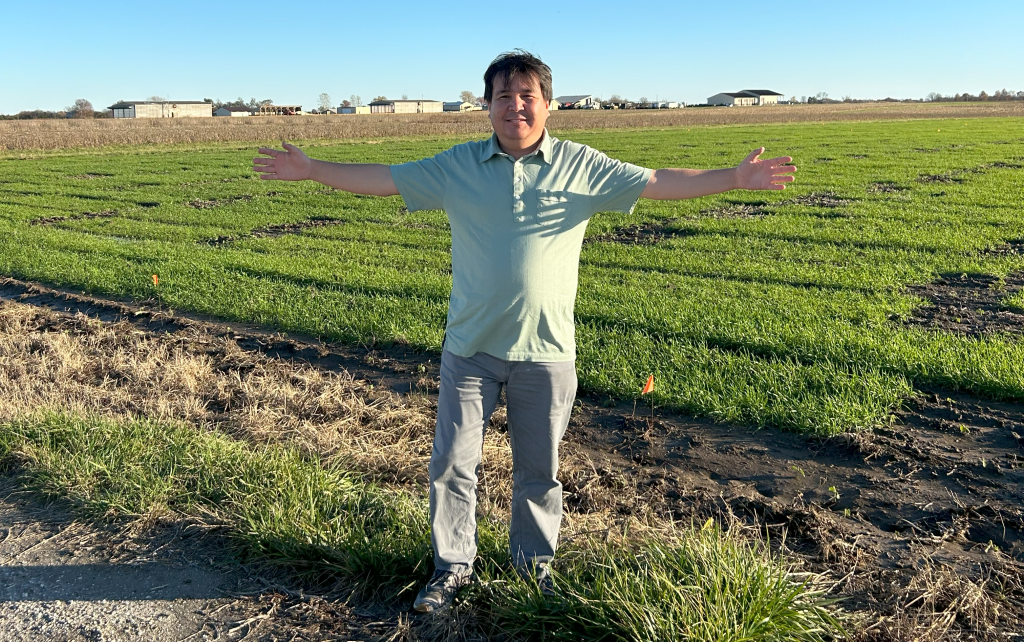Published on
Updated on
More Missouri farmers are planting wheat in their fields over the last five years, and, in response, Jafar Tanin, visiting scholar in the Division of Plant Science and Technology, has traveled from across the world to help revitalize the University of Missouri’s wheat breeding program.
“Most major crops in Missouri are soybean and corn,” Tanin said. “Wheat is not a major crop here, but last year, in 2023, 600,000 acres of wheat were harvested in our state, and if you compare that to the last five years, it has increased each year.”

According to MU Extension, wheat was the fifth-most commonly planted crop by acreage in 2023, accounting for approximately $161 million in revenue, and Tanin attributes that rise in popularity to increased usage for grain and as cover crops. Wheat is well-suited to being a cover crop for those major crops —soybeans and corn — because it is a winter crop that can be planted after traditional harvest season. He noted that by planting wheat as a cover crop, the farmer can both harvest the grain and collect cover crop incentives.
Mizzou’s wheat breeding program experienced significant success over the last century, including a wheat strain resistant to rust disease developed at Mizzou by Earnest and Lotti Sears in 1952. That strain of wheat became a worldwide food source.
More recently, the wheat breeding program has been dormant for the past several years after the retirement of Anne McKendry, who ran the program successfully for many years. Tanin was brought to the institution from his Ph.D. program in India to revitalize the program, receiving support as an Institute of International Education Scholar Rescue Fund fellow and through CAFNR’s investment and CAFNR International Programs’ facilitation and logistical efforts. Since arriving in the spring of 2024, Tanin has addressed logistical issues like servicing machines, sourcing wheat material to be planted and applying for additional funding — the later of which he said is his biggest challenge so far.
“With all of these challenges, I am working to successfully restart the program in order to fully meet the demand that the wheat farmers expect from us,” Tanin said.
During his Ph.D., Tanin worked on a wheat breeding project creating varieties that both produced high yields and were more nutritious by having higher amount grain protein. For Missouri farmers, he plans to focus on developing soft red winter wheat varieties with higher grain yield, resistant to fungal diseases such as fusarium head blight, and strip rust, better nutrition and grain quality, and are drought resistant.
“Drought resistance is particularly important with climate change,” he noted. “We just saw drought in October where here in parts of Missouri there was no rain.”
Tanin recently planted his first set soft red winter wheat research material as part of the program, which will provide him with the material he needs for future research as well as providing Missouri farmers with new wheat varieties. Future wheat varieties produced through MU’s wheat breeding program will be available through Missouri Crop Improvement Association, and Missouri Foundation Seed, which has been undergoing its own modernization and revitalization project.
Missouri Foundation Seed was established in 1944 as an avenue for the University of Missouri to take new plant breeds created by CAFNR researchers to market while also providing the highest quality seeds to Missouri farmers. It is located at South Farm, a 1,452 acres research farm just south of Columbia that is part of the Central Missouri Research, Extension and Education Center. Originally established in a partnership between the University of Missouri and the Missouri Crop Improvement Association, the program was turned over to the University of Missouri in 1962.